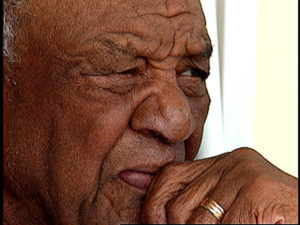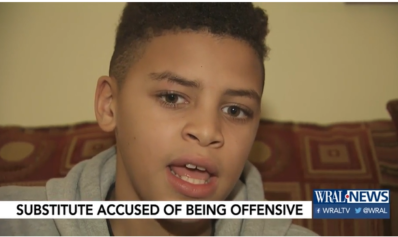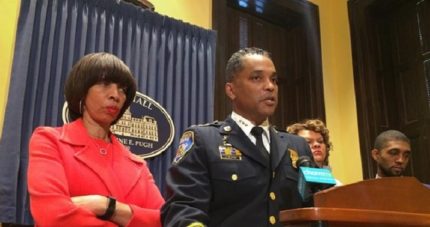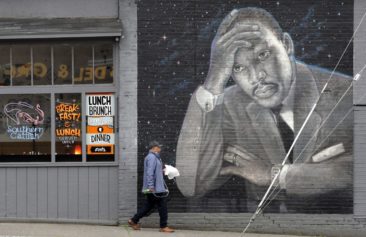
Taylor died appropriately enough on Easter Sunday after suffering a heart attack. Taylor had attended services at Mount Vernon Baptist Church in Durham, North Carolina, then went out to lunch with his wife Phillis, before succumbing at Duke University Medical Center.
Almost immediately, the effusive descriptions of Taylor began flowing in. At 96, a man whose father was born in 1870 to emancipated slaves, Taylor bore witness to much of the racial hatred that rained down on African-Americans throughout the 20th century. But he remained a steadfast figure, a towering orator who eventually became known as the dean of American preaching.
With his rumbling baritone, his infectious humor and his deep knowledge of Scripture, Taylor set the standard for generations of preachers who have studied his sermons. In fact, the Interdenominational Theological Center in Atlanta, a consortium of predominantly African-American seminaries, even has a Gardner C. Taylor Archive and Preaching Laboratory, with audio, video and text of his sermons.
From his perch as the senior pastor of the mammoth, 10,000-member Concord Baptist Church of Christ in Brooklyn’s Bedford-Stuyvesant, Taylor spread his influence across the nation and the world. He led the church for 42 years, from his appointment in 1948, several years after his graduation from Oberlin, until his retirement in 1990.
President Clinton, for whom Taylor gave his pre-inauguration sermon in 1993, once said of him, “For at least 20 years now, if anyone made a list of the five or six greatest preachers in America, Gardner Taylor would always be at the top.”
Clinton honored him in 2000 with the Presidential Medal of Freedom, the nation’s highest civilian honor.
Newsweek called him “one of the twelve greatest preachers in the English-speaking world.”
Taylor shared his brilliance with the world through numerous books and his more than 2,000 sermons. He was the recipient of 15 honorary doctorates.
Taylor is noted for his close friendship with Dr. Martin Luther King, with whom he led other Black clergy to break away from the conservative National Baptist Convention, U.S.A., America’s largest Black Christian denomination, because it was fearful of King’s bold confrontational tactics to fight segregation. They founded the Progressive National Baptist Convention, which was committed to social justice, desegregation and affirmative action. Taylor served as the organization’s president from 1967 to 1969.
Noted for his leadership skills, Taylor was a director of the Urban League of Greater New York and in 1958 was appointed by Mayor Robert F. Wagner Jr. to the New York City Board of Education, the second Black member in its history. He is credited with fighting de facto segregation in city schools during his three-year tenure and making the case that federal aid should be denied private schools while public schools were desperate for funds.
Though he became a northern institution at Concord Baptist, Taylor often referred to his childhood growing in the Jim Crow South in Baton Rouge, Louisiana. He told the story of how city leaders wanted to kill disease-carrying mosquitoes, so they sprayed pesticide in white neighborhoods and stopped at a street that was the unofficial border between the white and black areas.
Taylor described his uncle’s laughing reaction: “He said, ‘What do these people think? They think these mosquitoes will stop at Reddy Street?”’ Taylor said.
When his sermons were broadcast on NBC radio in the 1950s, he said many of the listeners had no idea he was African-American. So one day he got a letter from a Mississippi woman who told him she was the daughter of a Confederate soldier, her maiden name was Taylor and she wondered if they were related.
“I did not send her a picture of myself,” he said, laughing. “But I wrote and told her I doubted it.”
Through it all, Taylor always had an abiding passion for social justice and wasn’t shy about taking on the church for shirking its responsibilities.
“There is something wrong in a country as rich as this that we have so many people who are put on a kind of dump heap and thrown away,” he said. “Something wrong on the part of government, something wrong on the part of the churches, because we [the churches] have not put enough pressure on public institutions to do what ought to be done. The church has not exerted the influence of which we are capable. Many churches have food pantries and meals, and some have opened their doors to the homeless…but the response has not been nearly what it ought to be. What a vast difference the church could make if we worked together to solve some of these problems.”
Asked what scripture passage he would like to have read at his funeral, Taylor once said he would like 1 John 3:2.
“Now we are children of God, and what we will be has not yet been made known,” he quoted in his deep baritone. “But we know that when he appears, we shall be like him, for we shall see him as he is.”


